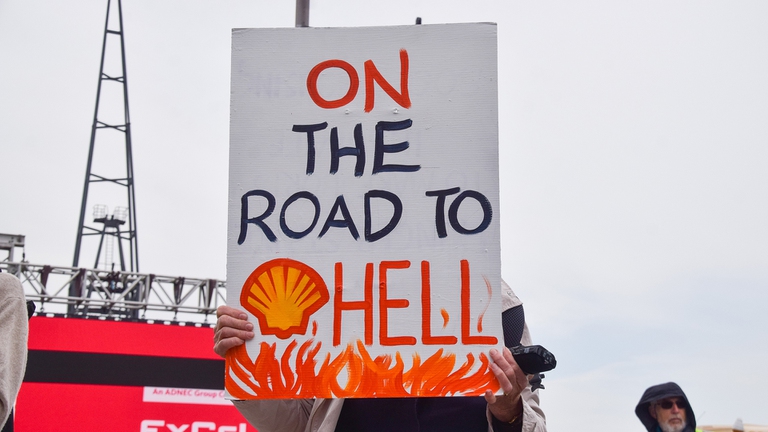https://www.lifegate.it/corte-olandese-shell
- |
- The Dutch Court of Second Instance accepts Shell's appeal filed by civil society organizations in 2019.
- The first instance ruling required Shell to reduce its emissions by 45 percent by 2030.
- There is no scientific consensus that establishes a specific reduction percentage that applies to individual companies like Shell.
The Dutch Court of Appeal recently cancelled the 2021 ruling presented by the Milieudefensie movement which forced Shell to reduce its emissions by 45 percent by 2030.However, he recognized the responsibility of all large companies, including Shell, to cut emissions under human rights regulations.This new ruling reiterates the obligation to reduce direct emissions derived from company operations (scope 1 and 2) and signals that the exploration of new oil and gas deposits is in conflict with the objectives of the Paris Agreement.

Because the sentence was annulled
The ruling of the Dutch Court of Appeal is the response to Shell's appeal, presented following the historic ruling of the District Court of The Hague, issued on Wednesday 26 May. The lawsuit was filed in April 2019 by a coalition of environmental organizations – Friends of the Earth Netherlands, Greenpeace Netherlands, ActionAid, Both Ends, Fossielvrij Nl, Jongeren Milieu Actief and Waddenvereniging – on behalf of 17,379 citizens.The arguments revolved around the Paris Agreement on the climate which envisages limiting the increase in average global temperatures to within 2 degrees centigrade compared to industrial levels, doing everything possible to avoid exceeding 1.5 degrees.By continuing to invest billions in the production of energy from fossil fuels, the lawyers argue, Shell breaks its duty of diligence and violates human rights.
The Court of Appeal overturned the ruling because the prosecution failed to demonstrate that Shell had an obligation to reduce its CO2 emissions by 45 percent to meet corporate social due diligence requirements.At the moment, in fact, there is no scientific consensus that establishes a specific reduction percentage to be applied to individual companies such as Shell.
But that's no favor to Shell
Not all is lost.In annulling the sentence, the Court of Appeal he stressed anyway that current regulations (such as the EU Directive on due diligence relating to corporate sustainability) already require companies to adopt emission reduction measures and left open the possibility of applying restrictions to all oil companies, preventing restrictions imposed only on Shell from giving competitors a competitive advantage.The obligation to reduce one's emissions derives, according to the Court, from the human right to protection against the dangers linked to climate change.“It's up to you first and foremost to the government to guarantee the protection of human rights, but indirectly these rights also influence the social due diligence that companies like Shell must observe,” the Court writes in its ruling.
According to Thom Wetzer, professor of law and finance at Oxford University, “the ruling might seem favorable to Shell, but in reality it establishes the principle that the Court of Appeal can impose absolute reductions in emissions.This is perhaps a Pyrrhic victory, which delays but does not avert the future."The sentence of November 12 “will make investors more cautious in investing in fossil fuel companies.Investors are viewing fossil fuel companies and their future prospects with increasing skepticism."Furthermore, according to the professor, society's judgment towards companies like Shell is hardening, fossil-based business models are at risk and investors are increasingly worried about the risks and the downward valuation of companies.
Growing lawsuits against Big Oil
The decision echoes one UK ruling, That blocks new oil and gas exploration projects consistently with the Paris Agreement.The victory of Milieudefensie has also inspired a movement across Europe in 2021 to hold large emitters accountable for their actions, and the principles of that cause are now integrated into the European legislation.According to Milieudefensie Shell is obliged to reduce its CO2 emissions based on social prudence
Lawsuits against fossil fuel companies are multiplying globally: more than 80 causes, according to the numbers released by the organization Zero carbon analytics, involving companies such as BP, Chevron, Eni, ExxonMobil, Shell and TotalEnergies, have been brought since the 2015 Paris Agreement, with the number continuing to grow.
“We are satisfied with the court's decision, which we believe is right for the global energy transition, for the Netherlands and for our company,” was Shell's response, released by its CEO Wael Sawan, who confirmed that the company's goal is to become a net-zero emissions company by 2050.
